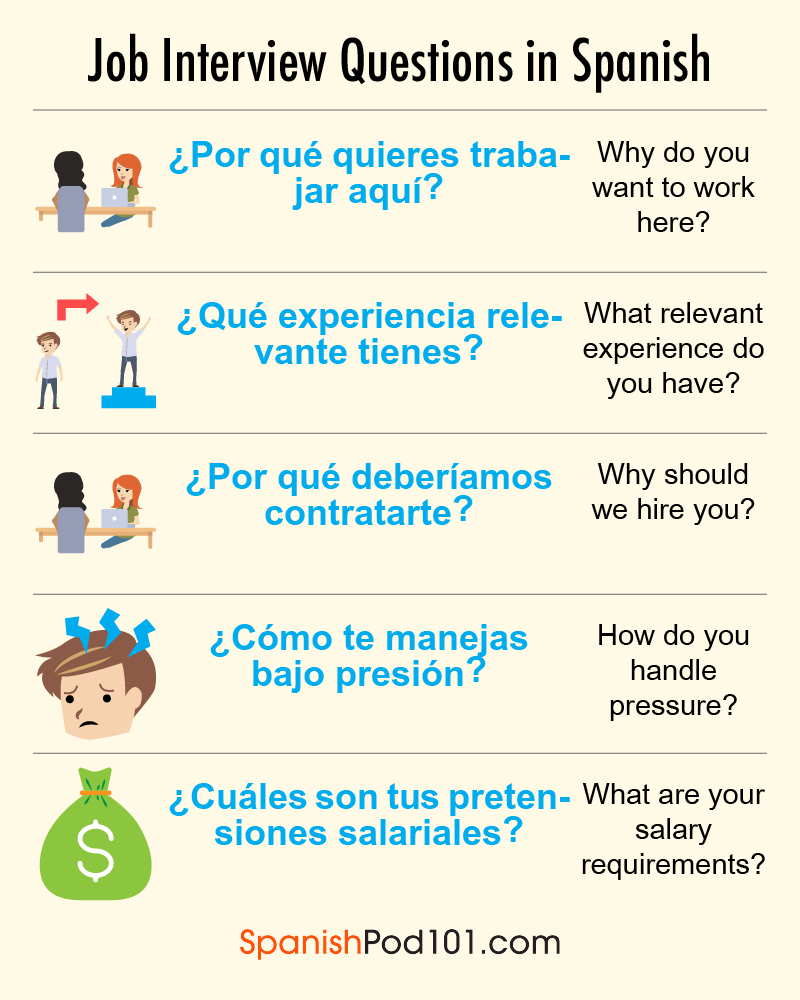
A lot of people who decide to learn Spanish do so because they’re thinking of moving to Spain or another Spanish-speaking country.
Even if this isn’t the case for you, you never know when knowing just a few basic Spanish business phrases will come in handy. For example, you might be the only person, or one of only a few people, in your company who speaks at least a little Spanish. If your boss ever required you to travel to Spain for a business trip, knowing some phrases for doing business in Spanish could be crucial for you!
At SpanishPod101.com, we think it’s better to be safe than sorry. Why not be ready for that moment?
 Table of Contents
Table of Contents
- Nail a Job Interview
- Interact with Coworkers
- Sound Smart in a Meeting
- Handle Business Phone Calls and Emails
- Go on a Business Trip
- How SpanishPod101.com Can Help You Master Spanish
1. Nail a Job Interview

If your intention is to work in Spain, one of the first things you need to sort out is, well, finding a job!
Lucky for you, we’ve already published an article on How to Find a Job in Spain. In that article, we even listed five questions that you’re likely to be asked in an interview, so we would definitely recommend that you take a look at them.
But there are a few more phrases and sentences that you should be familiar with. Some of these are quite simple, but that doesn’t mean you should overlook them!

Greetings
What’s the first thing you should say when you arrive at your job interview? You should greet your interviewer, of course! Here are some examples of appropriate Spanish business greetings:
- Hola.
Translation: “Hello.”
As you probably know by now, hola means “hello.” This greeting, while simple, is neither formal nor informal, and you can definitely use it to begin your job interview.
- Buenos días.
Translation: “Good morning.”
The greeting Buenos días is slightly more formal than Hola. Keep in mind that you can never go wrong with Hola, but Buenos días might be an even more appropriate greeting.
If you would like to learn other possible greetings to use for your job interview, read our article on How to Say “Hello” in Spanish.
Introductions
The next step in your greeting is to introduce yourself. Because the employer is probably interviewing several candidates, you’ll need to let them know who you are.
- Soy [name].
Translation: “I’m [name].”
In this case, we recommend using the form Soy ___, such as in: Soy Carlos. (“I’m Carlos.”) This is because the interviewer will most likely already be familiar with your name, but they might not know what you look like.
Other times, the person you meet at the reception desk might not know that you’re there for an interview, so you’ll need to specify this:
- Tengo una entrevista.
Translation: “I have an interview.”
Usually, you’ll make this sentence a little longer. For example, if you have an interview at ten in the morning, you can say:
- Tengo una entrevista a las 10. → “I have an interview at ten.”
If you know the name of the person who will be interviewing you, you can mention that as well:
- Tengo una entrevista con Pablo Martínez. → “I have an interview with Pablo Martínez.”
Other Useful Phrases
Once you’re at the interview, there are a few more sentences you should know. Here are a couple of useful examples:
- Disculpa, ¿podrías repetir la pregunta?
Translation: “Excuse me, could you repeat the question?”
Some Spanish speakers tend to talk a little bit too fast—sorry about that—so there might be a few times that you’re not entirely sure what the question was. Instead of guessing and giving a completely unrelated answer just to see if that’s what they meant, don’t be shy; just ask them to repeat the question.
- Tengo experiencia (en) ___.
Translation: “I have experience (in) ___.”
The interviewer will most likely ask you about your experience in the company’s particular industry, or even in the workforce in general. You can also opt to add how much experience you have. Some of your answers might be like the following:
- Tengo cinco años de experiencia trabajando como jardinero. → “I have five years’ experience working as a gardener.”
Thank Your Interviewer
- Muchísimas gracias por esta increíble oportunidad.
Translation: “Thank you very much for this incredible opportunity.”
This is a sentence that will always make you look good. Even if you’re not sure the interview went as well as you wanted it to, we think it’s always nice to thank your interviewers for considering you for the job and taking their time to interview you.

2. Interact with Coworkers

When you’re learning business Spanish, you can’t overlook the importance of knowing how to communicate and connect with your coworkers.
Let’s assume that your interview was successful and you got the job. First of all, congratulations! Now, let’s learn some more vocabulary that will be helpful for you on the job.
- ¡Hola, soy el nuevo programador!
Translation: “Hello, I’m the new programmer!”
On your first day at work, a few people might have already been told that you’d been hired, and others might have met you at the interview. But not everyone will know you, so you should introduce yourself.
While the example above refers to a male programmer, let’s look at an example for a female teacher:
- ¡Hola, soy Ana, la nueva profesora de matemáticas! → “Hello, I’m Ana, the new Math teacher!”
In this case, the sentence can be used to introduce yourself to both your new colleagues and your students. If you were talking to your students, you could change it to la nueva profesora to vuestra nueva profesora (European Spanish) or su nueva profesora (Latin American Spanish) so that it means “your new teacher,” but it’s not absolutely necessary.
You might have noticed that in this example, we also included one of the elements we discussed above: stating your name.

- Disculpa, ¿me puedes ayudar?
Translation: “Excuse me, can you help me?”
When you start a new job, you’ll have lots of questions and doubts. Even if you’re an expert in your field, getting a job in a new company means there will be aspects of the job that are new to you. Never underestimate the importance of asking for help!
There are a few other ways of asking this same question, some more formal and others less formal. The one we listed above is simple and slightly more formal than others. But the following example is a very casual way of asking someone for help, since it includes an informal expression:
- Perdona, ¿me puedes echar una mano con esto? → “Excuse me, could you give me a hand with this?”
Interestingly, the expression echar una mano has a nearly literal translation in English: “to give a hand.”
- ¿Me puedes explicar cómo funciona?
Translation: “Could you explain to me how it works?”
This question might refer to a specific aspect of your job, such as a new software program you don’t entirely understand yet, a machine you need to operate, or anything you come across that’s either new or complicated.
- Lo siento, me he equivocado.
Translation: “I’m sorry, I made a mistake.”
Some people have difficulty admitting that they made a mistake, but we believe it’s important to be honest. After all, it’s common to make a few mistakes, especially when you’re new. Your coworkers also started somewhere, and we’re sure that they’ll understand.
- ¿Puedes decirle al jefe que estoy enfermo?
Translation: “Could you tell the boss I’m sick?”
There are several ways to let your employer know that you’re sick and won’t be able to go to work. One of them is to text a close colleague and get them to talk to your boss. Of course, you could also call your boss yourself and say something like this:
- Estoy enfermo y no voy a poder venir/ir hoy. → “I’m sick and I won’t be able to come/go today.”
We hope your boss will wish you a speedy recovery, like so:
- De acuerdo, mejórate pronto. → “Alright, get well soon.”
- ¿Quieres ir a tomar algo luego?
Translation: “Would you like to have a drink later?”
In a new job, it’s always nice to make some friends. This is where it’s important to note that Spanish for business isn’t limited to what goes on in the workplace!
There’s not always enough time to chat at work, so it’s very common to go out with coworkers for a cup of coffee or even a beer. In Latin American Spanish, the verb tomar refers exclusively to drinking alcohol, but in Spain, it can mean any kind of drink (and sometimes even food). It’s a very versatile term.
- Qué pesado es Ernesto. No me deja en paz.
Translation: “How annoying is Ernesto. He won’t leave me alone.”
Sometimes, things don’t go very well at work and we might not always get along with our coworkers. This is why we thought it might be useful for you to know how to complain about someone.
- Querría presentar una queja formal.
Translation: “I would like to present a formal complaint.”
While the previous example was just a casual complaint about a coworker, this is a phrase you would use if things at work had gotten pretty ugly. We hope you don’t need this one, but we’ll leave it here just in case!

3. Sound Smart in a Meeting
Some workplaces require that you attend regular meetings. We can’t prepare you for the specific meetings that you’ll have, but we can offer a few useful Spanish phrases for business meetings and expressing your opinion.

- Creo que…
Translation: “I think…”
One of the most basic ways of expressing your opinion is to say what you think.
- Creo que es una buena idea. → “I think it’s a good idea.”
Other times, you might want to say the opposite:
- No creo que tengas razón. → “I don’t think you’re right.”
Remember that, just like in the example, the adverb no will always be in front of the verb.
- Me gustaría hacer una propuesta.
Translation: “I would like to make a suggestion.”
If you’re shy, offering a suggestion at work may be difficult for you. If this is the case, we hope that you gain the confidence you need to do so and make your voice heard. Using this phrase is a great way to ensure that they’ll take you seriously and consider your idea. ¡Buena suerte! (“Good luck!”)
- Estoy de acuerdo contigo.
Translation: “I agree with you.”
It’s very important to know how to tell someone that you agree with them, whether in a meeting, at the office, or while going about your day-to-day life.
- No estoy de acuerdo con lo que has propuesto.
Translation: “I disagree with what you’ve suggested.”
Knowing how to express disagreement is just as important as knowing how to agree.
- ¿Puedes terminar esto para mañana?
Translation: “Can you finish this by tomorrow?”
If tasks are being delegated during the meeting, there’s a chance that you’ll need to ask someone to finish a certain task or project.
4. Handle Business Phone Calls and Emails
Whether you work in an office or not, you should be ready to take phone calls and handle your business email in Spanish.
- Buenas tardes, le atiende Sandra.
Translation: “Good afternoon, Sandra speaking.”
If you have to answer phone calls at work, your company might have a standard phrase for you to use. But in case they don’t, this is a rather common and simple way of doing so. Of course, the beginning of the sentence will change depending on the time of day.
Sometimes, the company you work for will ask you to state the name of the company when you answer the phone. Let’s say you’re working for SpanishPod101.com, it’s nine in the morning, and you need to take a phone call. Here’s something you could say:
- SpanishPod101.com, buenos días, le atiende Paula. → “SpanishPod101.com, good morning, Paula speaking.”

- ¿Me puede decir su nombre, por favor?
Translation: “Could you tell me your name, please?”
Sometimes you might have to ask for the customer’s name. In most companies, you’ll be told not to ask for their name directly, but to ask it in a way that’s more formal and not too direct (like in the example sentence). However, if there’s no such policy, you’ll be able to use the more common sentence below:
- ¿Cómo te llamas? or ¿Cómo se llama? [if you still need to speak formally] → “What’s your name?”
- Gracias por contactar con [company name].
Translation: “Thank you for contacting [company name].”
Once again, the company you’re working for might have a script that includes thanking the customer for calling or emailing them. This phrase is rather flexible, and can be used at the beginning or end of the call, depending on your company’s specifications.
- Estimada Marta,
Translation: “Dear Marta,”
As you may have guessed, this is a standard Spanish business email greeting. You’ll use it at the beginning of a letter or an email.
If the email or letter you’re writing doesn’t need to be too formal and will be sent to someone you know well, you can change the Estimado/a to Querido/a.
- Atentamente
Translation: “Sincerely”
Just like in English, there are a few different Spanish business email closings that are considered appropriate, some more formal than others. We think Atentamente is a good choice for all formal and business emails.
5. Go on a Business Trip
In the introduction to this article, we explained that maybe you don’t plan on moving to Spain and working there, but that you might need to go there on a business trip at some point. If this is the case for you, you might find this next section useful.
- Esta semana tengo que irme de viaje de negocios a Italia.
Translation: “This week, I need to go on a business trip to Italy.”

- Buenos días, tengo una reserva a nombre de Andrea Pérez.
Translation: “Good morning, I have a booking under Andrea Pérez.”
One of the first things you might do when you arrive at your hotel will be to mention that you have a reservation. If you don’t, well, that’s another story, so we’ll leave it for the next item on our list!
- Buenas tardes, ¿tienen alguna habitación libre para esta noche?
Translation: “Good afternoon, do you have a free room for tonight?”
If you don’t have a room booked—which is unlikely in the context of a planned business trip, unless something has gone wrong—you’ll need to use this sentence.
- Gracias por tu hospitalidad.
Translation: “Thank you for your hospitality.”
You might not always need this sentence, but we think it’s still good to know.
6. How SpanishPod101.com Can Help You Master Spanish
We hope you found this article useful and that it helps you in the future! Even if you never go on a business trip to Spain, a huge portion of the vocabulary listed in this article can still prove helpful when traveling to Spain for leisure purposes, or when you need to speak Spanish in a non-casual situation.
SpanishPod101.com has even more great lessons related to business Spanish and other basic phrases you should know. Check out the following vocabulary lists:
- Must-Know Business Words and Phrases
- 10 Lines You Need for Introducing Yourself
- Most Common Ways to Say Goodbye
Happy learning!










